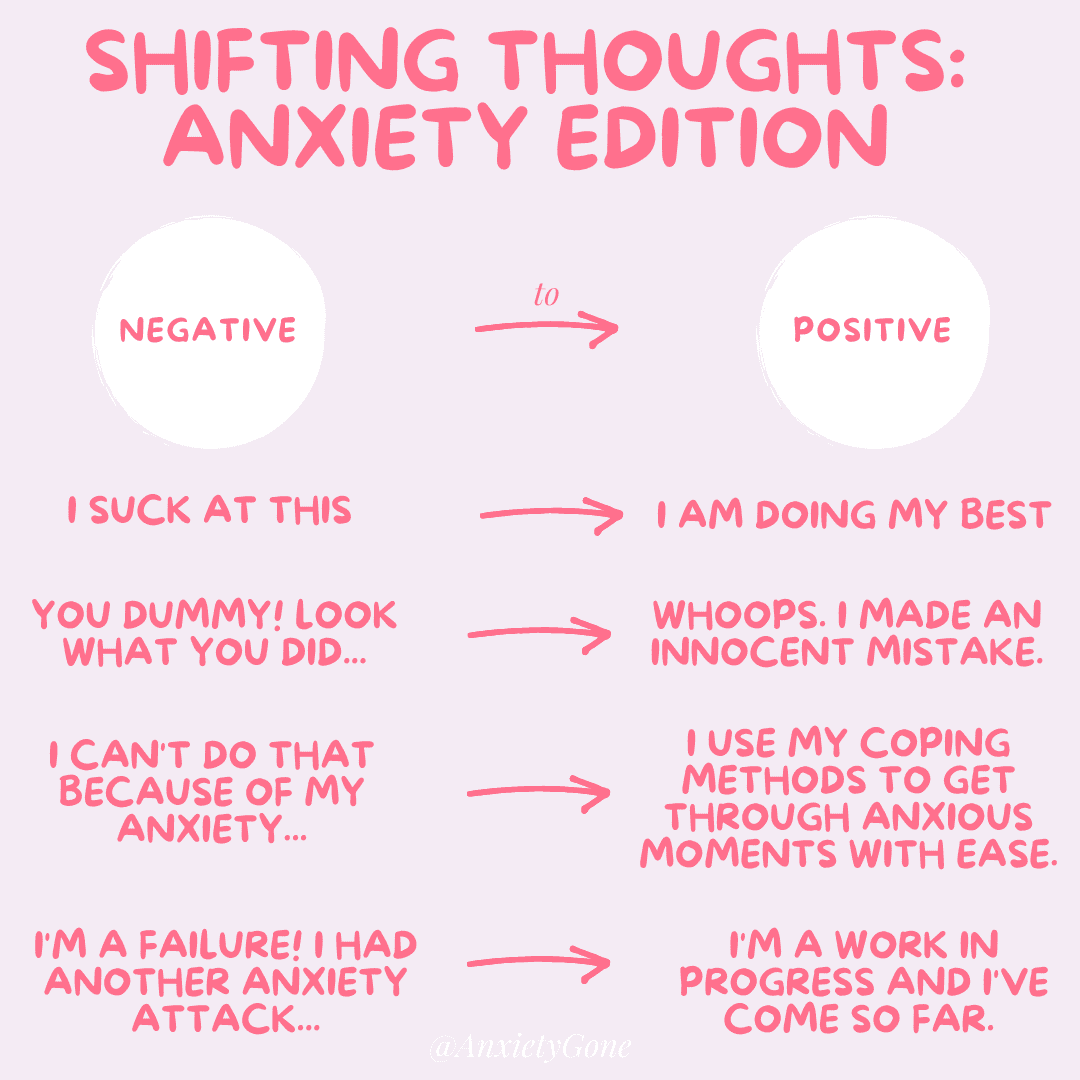Full Disclosure: Clicking on these links could mean a tiny commission for me, at no extra cost to you.
Negativity always seems to find those who are most negative and there’s a good reason for this: it’s one of the many toxic effects of negative thinking. While there’s an easy solution if you are the one surrounded by negative people, it’s an entirely different ballgame when you, yourself, are struggling with bad thoughts. It isn’t as simple as “just thinking positive”, and there’s actually a secret to the madness.
What is Negative Thinking?
Each one of us has an inner critic. Sometimes, that little voice inside does us plenty of good and other times, it can really bring us down with negative and intrusive thoughts. This inner dialogue – good and bad – is something we all experience. However, sometimes our inner voice can be more harmful than helpful. This is when your negative thinking, also known as negative self-talk, becomes so frequent that it’s disrupting to your mood, mental health and maybe even your life. The effects of negative thinking start limiting your ability to believe in yourself and it starts diminishes your ability to remain positive in your life and to have the confidence to do so.
Examples of Negative Self-Talk
The effects of negative self-talk vary as your inner critic’s dialogue can come in many forms. It can sound insecure and shy, or downright mean and hurtful. It can follow the path of typical cognitive distortion: catastrophizing thoughts, blaming, and the like. Here are some examples of what these types of bad thoughts look like:
- I’m not good at this.
- I can’t do anything right.
- Of course, that [negative situation] would happen to me.
- I will never achieve anything worthy.
- I’m useless.
- I am not worthy of love.
- I’m ugly.
- I’m fat.
- I have no friends.
- No one likes me.
Fast, Affordable Therapy and Medication
Medication and therapy work better together — and Hims/Hers make getting support simple. Connect with licensed providers online, receive personalized treatment plans, and access medication — all from the comfort of home. No long waits, no stress — just expert care made easy.
Where Do Negative Thoughts Come From?
There are no definite findings as to where negative thoughts come from because everyone has their own unique experience that has made them the way they are today. It’s important to learn how to identify your bad thoughts specifically, so you can better understand the root cause of them.
Often times, negative thoughts stem from depression or insecurity. Understanding where the depression and security come from can help you put a finger on the exact moment or person that contributed to your limiting, negative self-talk. Here are some situations or habits that can cause your inner critic to be harder than most:
- Illness
- Poor health habits
- Life events
- Personality problems
- Substance abuse
- Not asking for help
- Failing to practice self-care (self-love)
- Frequent criticism
- Cynical thoughts
- Abuse
- Not addressing relationship problems
- Too much time alone
- Surrounding yourself with negative people
Effects of Negative Self-Talk
It may seem like nothing more than a bad habit that you picked up from being around negative people, but there are some pretty damaging effects of negative thinking. Understanding what those risks are should give you the motivation to start calling out your inner critic anytime they raise their voice.
Negativity leads to increased risk of mental health problems
Those who find themselves frequently engaging in negative self-talk tend to be more stressed than those who have a more positive inner dialogue. Numerous studies have found that frequent negative self-talk and ruminating negative thoughts are linked to an increased risk of mental health problems, including depression and anxiety. Frequent criticism, cynical thoughts, and denial are also shown to create neural pathways in the brain that encourage sadness.
Negativity changes your brain and body
Your brain is has the ability to rewrite old patterns and beliefs through a process called neuroplasticity. When you are constantly overwhelmed with critical thoughts, your brain and body become more stressed. This causes your body to release more stress hormones (cortisol), which can affect your sleep, mood, mental health and physical health.
Negative thinking becomes a bad habit
The more you invest in bad thoughts and negative self-talk, the better you become at it.
It’s that simple.
Negative thoughts lead to decreased motivation
When your inner critic is constantly telling you that you suck and you’ll never be good at anything, it immediately begins to drain all of your motivation. The more you have these bad thoughts, the more you begin to believe what it is that’s being said. And e.
Thinking negatively can lead to greater feelings of helplessness
Focusing on negative thoughts can lead to greater feelings of helplessness. When you feel worthless and helpless, you typically don’t have the energy of confidence to make positive moves in your life. This can leave you feeling unmotivated and helpless.
Negative thoughts can stunt your success
Thinking negatively can lead to missed opportunities
Negative thought patterns typically have a demeaning, bullying tone that can make you doubt all of your beautiful traits, skills, talents, and abilities. This can lead to many missed opportunities, as your inner critic has already convinced you that you’re just not good enough.
You start to form limiting beliefs
One of the worst toxic effects of negative thinking (IMO) is the limiting beliefs that come with it. The more you tell yourself you can’t do something, the more you believe it.
Negative thinking can cause relationships to strain
We all like to think that having negative inner thoughts only affects us, but it has a trickling effect on all aspects of your life, including your relationships. The constant self-criticism can make you feel insecure and needy, your negative self-talk begins to turn into general negative habits that bother others, your communication lacks and the passive aggressive “playfulness” can take a toll.
How to Stop Negative Thoughts
The more you try to avoid a thought, the more likely you are to experience that thought over and over again until you address it. For this reason, it is never recommended to try stopping or avoiding your bad thoughts. They will come back, harder and louder. However, that doesn’t mean that you have to put up with the out-of-control negative self-talk in the meantime either.
Types of negative thoughts
Negative self-talk comes in many forms. Some common forms are:
- Filtering – Magnifying the negative aspects of a situation and filtering out all of the positive ones. For example, you can have the best day ever but you tend to focus on getting that one red light on the way home instead of all of the good that happened.
- Personalizing – Anytime something bad happens, you automatically blame yourself. For example, if plans change you immediately assume that it’s because no one likes you.
- Catastrophizing – You automatically expect the worst. For example, you hit some light traffic on your way to work and expect that the rest of the day will also be a disaster.
- Polarizing – Things are either good or bad – no inbetween. For example, you either feel perfect or like a total failure.
Ways to Correct Negative Self-Talk
Anyone can learn how to turn negative thinking into positive thinking. The process is also quite simple, but it does take time and practice. Different strategies work better for different people, so try these mental health tips and see which ones work best for you.
Identifying negative thinking
Name Your Inner Critic
Yes, really. Creating a ‘persona’ for your inner critic can help you separate yourself from those negative thoughts. This makes it easier to realize that you don’t have to agree with your inner critic and that you aren’t your inner critic, and it immediately becomes less threatening.
Check your inner critic
Make a conscious effort to check in with your inner critic (bad thoughts) throughout the day so you can make adjustments as needed. For example, when I make silly mistakes I would often say “oh you dummy” to myself. Once I started paying attention to this, I was shocked at how often I told myself I was dumb even though I was just making a joke at my own expense. Now, I say, “Oh, you’re silly!” It allows me to still express my outburst without feeding into a negative self-image.
Cut out the toxic relationships
It can seem impossible to transition a negative inner dialogue to a positive one when you’re constantly surrounded by people doing the opposite. Make sure those in your life are positive, supportive people that inspire you to be the best version of yourself. Plus, spending too much time with negative people can increase your stress and anxiety levels.
Speak to yourself like you would a friend
Follow this one simple rule: if you wouldn’t say it to someone else, don’t say it to yourself. Aim to have the same level of compassion for yourself as you do those around you. Be gentle and encouraging, and when a bad thought pops in your head, acknowledge it and then, respond with a positive affirmation.
Fact-check your inner critic
Your inner critic is a liar. There. We said it. You must challenge your bad thoughts and the easiest way to do this is to ask yourself how true your negative self-talk is. For example, are you really going to end up homeless because you got a C on your test instead of an A? If it’s not a fact, don’t give it any attention.
Redirect negativity to neutrality
One of the best routes to combating negative self-talk is by replacing it with something better. This is the process of taking a negative thought and changing it to something encouraging. It can sometimes be difficult to force yourself to stop bad thoughts in its tracks. Here are some examples of what redirecting negative thoughts look like:

Other helpful tips
If you’re finding it quite difficult to stop your negative thoughts, here are some additional tips that can help:
- Use tourmaline crystals to keep negativity away
- Snap a rubber band on your wrist when you notice negative self-talk
- Visualize a stop sign
- Practice positive thinking every day and often
- Bring your focus to gratitude when negativity pops in
- Practice mindfulness to stay present
- Use a grounded technique to remain present – List things that you see, smell, hear, taste, and feel
Learning how to stop negative thinking takes time. Remember, practice makes perfect. Use these tips for reframing anxious thoughts and to minimize the effects of negative thinking. With some consistency, ou actively train your brain to think positive thoughts instead of negative ones. You can also rewire your anxiety triggers, behaviours and patterns and experience less anxiety and depression, as well as numerous health benefits.










